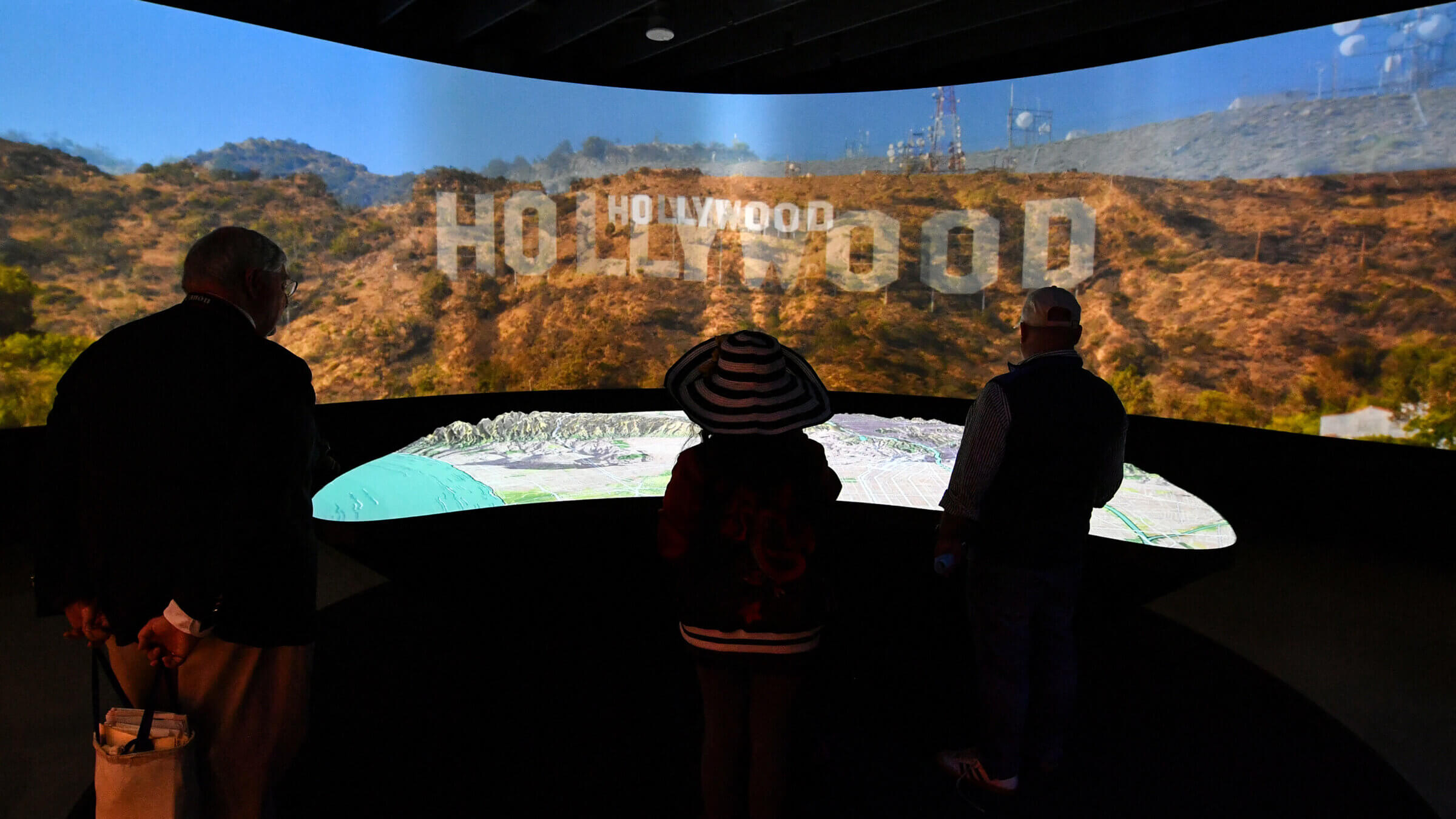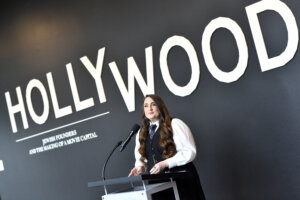How I helped bring the story of Hollywood’s Jewish founders to the Academy Museum — where it belongs
The museum’s new ‘Hollywoodland’ exhibit offers a needed corrective for (some of) its previous oversights

Visitors attend Hollywoodland: Jewish Founders and the Making of a Movie Capital at the Academy Museum in Los Angeles. Photo by Getty Images
When the Academy Museum of Motion Pictures opened its doors in September 2021, I expected it to pay homage to Hollywood’s pioneer Jewish moguls. These men transformed themselves from immigrant and first-generation shtetl Jews to personifications of the American dream (Lazar Meir became L.B. Mayer; Schmuel Gelbfisz became Sam Goldwyn; Wilhelm Fried Fuchs became William Fox; and Hirsz, Aron, Shmul, and Itzhak Wonskolaser became Harry, Albert, Sam and Jack Warner) and launched an iconic, globally influential American industry. My great-grandfather, Sol M. Wurtzel, production head of Fox Film (later 20th Century Fox), was one of these men.
Wurtzel and his colleagues developed eight major motion picture factories (Fox, Metro-Goldwyn-Mayer, Universal, Paramount, United Artists, Warner Bros., Columbia and RKO) in a Southern California outpost studded with citrus groves, bean fields and oil derricks.
After I first visited the Academy Museum and discovered it lacked substantive content featuring Hollywood’s Jewish origin story I wrote “Jews built Hollywood. So why is their history erased from the Academy’s new museum?” for the Forward. Its publication unleashed a paroxysm of donor and public ire. A vocal legion of film historians, proud Jews and Hollywood descendants believed the moguls deserved their close-up — an examination of their meteoric rise from impoverished immigrant backgrounds to motion picture titans.
Six months later, the museum announced plans for its first permanent exhibition, Hollywoodland: Jewish Founders and the Making of a Movie Capital, to be helmed by associate curator Dara Jaffe. Soon thereafter, the museum hired Neal Gabler, author of An Empire of Their Own: How the Jews Invented Hollywood as the exhibition’s adviser.

Though Gabler’s book, published in 1988 and now on its 30th print run, is widely considered the gospel on Hollywood’s founders, his involvement made me wary. His book’s broad-brush group portrait of Hollywood’s pioneer Jews includes this generalization, “Hollywood was itself a means of avoiding Judaism, not celebrating it.” Considering the history of my family and members of other Hollywood pioneer families (including Mayer, Selznick, Lasky, Laemmle) I’ve met over the past 50 years, this struck me as an overstatement. Case in point: My great-grandfather Sol co-founded and served as first president of Temple Israel of Hollywood in 1926. The still-thriving, social-justice-oriented congregation begins celebrating its centenary next year.
Feeling compelled to counter Gabler’s narrative and speak my family’s truth and advocate for a more nuanced portrait of Hollywood’s Jewish founders, I emailed Jaffe to volunteer background information based on my years spent researching Hollywood history and lived experience listening to my Wurtzel elders.
Sol’s daughter, my grandmother Lillian Wurtzel Semenov, transmitted her passion for chronicling her father’s filmmaking career and family life in early Los Angeles to me. She worked on the Fox lot as a young woman in the 1930s and later compiled and edited a batch of letters (dated 1917-1923) between Sol and his uber-mogul boss William Fox published in 2001.
My great-uncle Paul Wurtzel, a walking Hollywood history museum until he died at 92 in 2014, spent 45 years as an assistant director in film and television. After he retired, he regaled me with family lore and stories of his life and career. He died believing no one gave a damn about true Hollywood history and our family’s complicated Jewish legacy.
After I explained all this, Jaffe and I began a two-year information exchange. A 37-year-old film scholar and historian, with several Academy Museum exhibitions, including Casablanca, under her belt, she put her heart and soul into curating Hollywoodland. The long-anticipated exhibition opened May 19 right in the middle of Jewish American Heritage Month.
Jaffe’s attention to historic detail highlights the exhibition’s three sections: “Los Angeles: From Film Frontier to Industry Town, 1902-1929 (an immersive projection timeline akin to a miniature version of Disneyland’s “Soarin’ Over California”); “Studio Origins” — wall-mounted panels exploring the founding of Hollywood’s original eight major studios; and the exhibition’s must-watch 30-minute documentary From the Shtetl to the Studio: The Jewish Story of Hollywood, narrated by Turner Classics Movies host and author Ben Mankiewicz, grandson of brilliant screenwriter Herman Mankiewicz and grandnephew of four-time Academy Award-winning director Joe Mankiewicz.

The documentary powerfully evokes the tension between the Jewish moguls’ fear of antisemitism and their hopes and dreams for acceptance in America. Jaffe and her documentary production team constructed an 11-segment narrative chronicling the moguls’ transformation from lowly shtetl dwellers to powerful Hollywood studio heads — and the external forces that shaped them: rampant antisemitism and xenophobia.
The moguls assimilated, kept their heads down and cranked out movies to keep their families employed (nepotism was a given) and their studios (walled, palm tree-lined, sunny California shtetls where they called the shots) running. I detected an echo of Gabler’s broad brush approach when the documentary referred to the moguls’ homogenous backgrounds. An overgeneralization considering the Jewish pioneers came from different parts of Europe and the Americas. But they did have this in common: They were striving Jewish storytellers and tough businessmen.
At the Hollywoodland press preview, I discovered that Jaffe had included my name in the documentary’s closing “thank you” credits. The Fox Film wall mount panel showcased a humorous 1919 production missive from William Fox to Sol that my grandmother found in her parents’ basement and preserved for posterity. The immersive timeline included a reference to Sol’s co-founding of Temple Israel in 1926. Mixed emotions washed over me — pride in our Hollywood Jewish legacy and sorrow that my grandmother and Uncle Paul didn’t live to see the proof that people gave a damn.
Far from perfect, the moguls lived messy lives littered with extramarital affairs, severed relationships and fortunes made and lost. Yet they left an enduring legacy of marginalized underdog and immigrant storytelling that persists to this day.
The Academy Museum’s long-awaited exhibition Hollywoodland captures the founding Jewish moguls’ humanity with wide-angle nuance and empathy.
A message from our Publisher & CEO Rachel Fishman Feddersen

I hope you appreciated this article. Before you go, I’d like to ask you to please support the Forward’s award-winning, nonprofit journalism so that we can be prepared for whatever news 2025 brings.
At a time when other newsrooms are closing or cutting back, the Forward has removed its paywall and invested additional resources to report on the ground from Israel and around the U.S. on the impact of the war, rising antisemitism and polarized discourse.
Readers like you make it all possible. Support our work by becoming a Forward Member and connect with our journalism and your community.
— Rachel Fishman Feddersen, Publisher and CEO






























